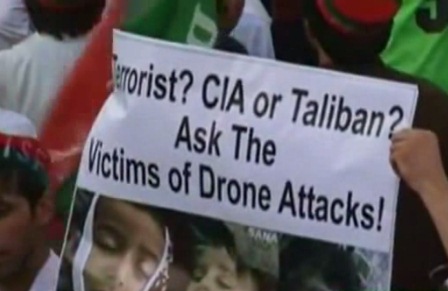 (CNN) -- Drone strikes against militants in Yemen are intensifying as the U.S. Embassy there and in other Middle Eastern and African countries remain closed amid terrorism fears.
(CNN) -- Drone strikes against militants in Yemen are intensifying as the U.S. Embassy there and in other Middle Eastern and African countries remain closed amid terrorism fears.
Six suspected U.S. drone strikes have been reported in the past two weeks alone. They have killed at least 29 people, according to a tally by Yemeni officials.
The latest strike happened early Thursday in central Yemen, where six people were killed, including four with links to al Qaeda, local security officials said.
Two civilians were among those killed in the strike in Mareb province, which targeted two vehicles, the officials said.
"Mareb was a previous stronghold for al Qaeda, and a number of members of the group still live in the province," a security official said.
Al Qaeda in the Arabian Peninsula, the terror group's Yemeni affiliate, shot down a Yemeni military helicopter in that province Tuesday, a government official said.
A day earlier, two drone strikes in Shabwa province killed a total of six militants, according to several official sources in Yemen not authorized to be named.
Al Qaeda message
The heightened strikes parallel the temporary closing of U.S. embassies and consulates in the Middle East and Africa over fears of an imminent terrorist strike. The United States on Tuesday urged all Americans to leave Yemen.
It was unclear whether this week's strikes were related to the security alert in place in the country since U.S. officials intercepted a message from al Qaeda leader Ayman al-Zawahiri to operatives in Yemen telling them to "do something."
The message was sent to Nasir al-Wuhayshi, the leader of AQAP. U.S. intelligence believes al-Wuhayshi has recently been appointed the overall terror organization's No. 2 leader.
Local security officials, speaking on condition of anonymity, said that they do not believe any of those killed Tuesday or Wednesday were senior al Qaeda members.
AQAP recoil
AQAP appears to have lost some of its effectiveness in the past year, while Yemen's military has made gains.
Yemen's government foiled an al Qaeda plot to capture oil and gas facilities and to seize two key southern ports early this week, a spokesman for the prime minister said. An official downplayed the terror organization's ability to carry out such an attack.
"AQAP has neither the manpower nor the capabilities to capture ports or seize pipelines," the official said. Government forces can handle any assault they may attempt, he said.
AQAP has not mounted a large-scale suicide attack on Yemen's security forces since May 2012, when more than 100 soldiers were killed by a suicide bomber as they trained for a parade in Sanaa, the capital.
In July, a bomb killed several soldiers there.
Many of AQAP's operatives, including its leadership, have retreated into remote areas to regroup after a Yemeni military offensive last year.
Yemeni security forces have over the past 18 months recaptured swathes of territory that were briefly held by AQAP, particularly in the south.
Local criticism
But the drone strikes are stirring anger among Yemenis.
The country's Nobel peace laureate Tawakkol Karman condemned Thursday's attack.
"The killing conducted by unmanned planes in Yemen is outside the law and worse than the terrorist activities of individuals and groups," she said.
She said that they are "degrading" to Yemenis and violate their human rights.
CNN's Laura Smith-Spark contributed to this report
Portland and Seattle
Free Subscription to Breaking News
Free Subscription to Breaking News




















































































































































































































































































































































